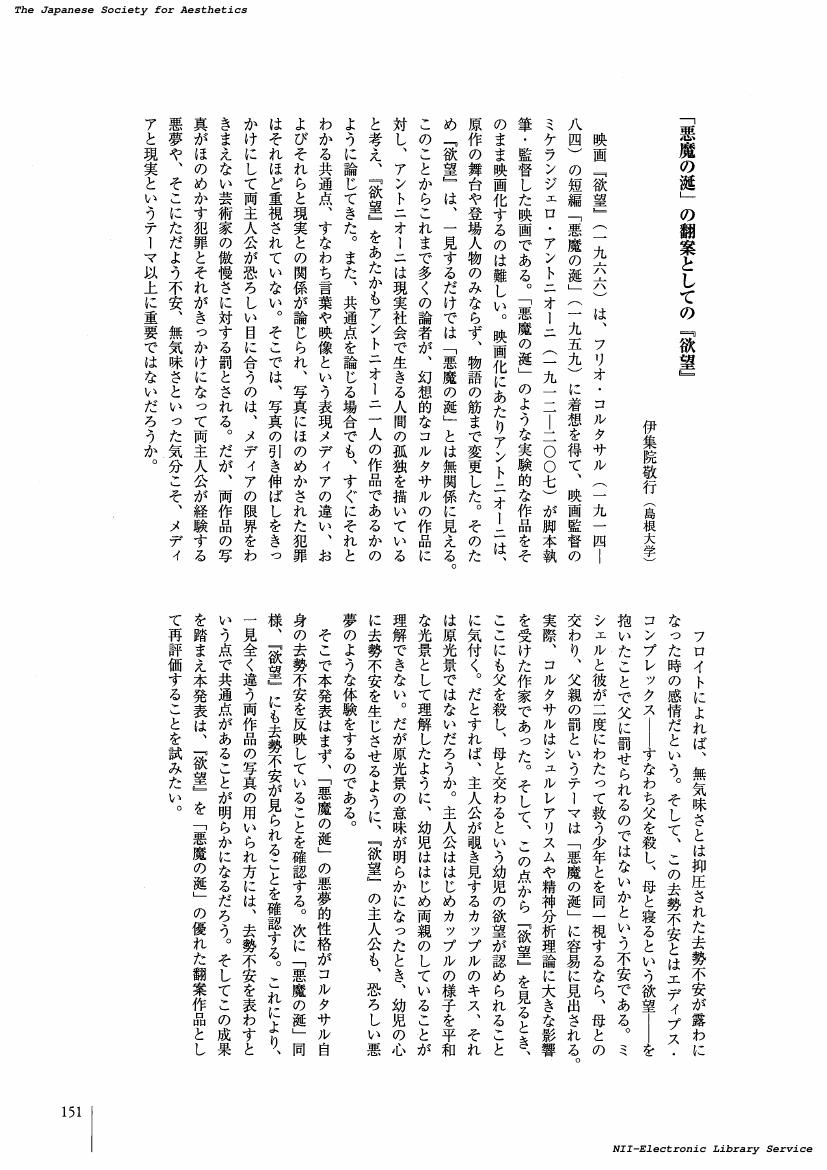3 0 0 0 IR 『君の名は。』の精神分析的解釈の試み
- 著者
- 伊集院 敬行
- 出版者
- 島根大学法文学部
- 雑誌
- 島大言語文化 : 島根大学法文学部紀要. 言語文化学科編 (ISSN:13423533)
- 巻号頁・発行日
- no.49, pp.87-114, 2020-10-31
2 0 0 0 IR 中井正一の映像論に見られる精神分析理論的傾向について
- 著者
- 伊集院 敬行
- 出版者
- 島根大学
- 雑誌
- 島大言語文化 : 島根大学法文学部紀要言語文化学科編 (ISSN:13423533)
- 巻号頁・発行日
- vol.30, pp.139-157, 2011-03-19
- 著者
- 伊集院 敬行
- 出版者
- 美学会
- 雑誌
- 美学 (ISSN:05200962)
- 巻号頁・発行日
- vol.66, no.2, pp.85-96, 2015-12-31 (Released:2017-05-22)
Inspired by a short story by Julio Cortazar's "Las babas del diablo" (1959), Michelangelo Antonioni both wrote and directed Blow-Up (1967). However for a lot of people, it seems that Blow-Up was loosely based on Cortazar's story. "Las babas del diablo" is a fantastic story. On the other hand, Blow-Up was regarded as 'absurd', like Antonioni's previous other existentialistic films. But, we can't overlook the uncanny atmosphere common to both works. According to Freud's "The Uncanny", a sense of the 'uncanny' derives from the anxiety caused by a repressed infantile 'castration complex'. Certainly we can find an oedipal scenario in "Las babas del diablo". In fact, Cortazar had been influenced deeply by Freud's writings and surrealistic literature. Furthermore, if we search for an oedipal complex in Blow-Up, we can notice this phenomenon. So, this paper tries to find the close relationship between these works from a psychoanalytic point of view, and to clarify that although Blow-Up does not follow the text of "Las babas del diablo" closely, Antonioni's adaptation shows his keen understandings of Cortazar's story.
1 0 0 0 OA 「悪魔の涎」の翻案としての『欲望』(西部会第三〇〇回研究発表会,例会・研究発表会要旨)
- 著者
- 伊集院 敬行
- 出版者
- 美学会
- 雑誌
- 美学 (ISSN:05200962)
- 巻号頁・発行日
- vol.65, no.2, pp.151, 2014-12-31 (Released:2017-05-22)
- 著者
- 伊集院 敬行
- 出版者
- 美学会
- 雑誌
- 美学 (ISSN:05200962)
- 巻号頁・発行日
- vol.61, no.1, pp.174, 2010-06-30 (Released:2017-05-22)

